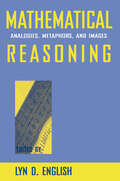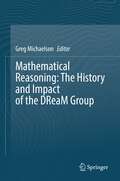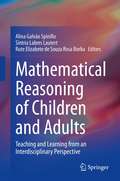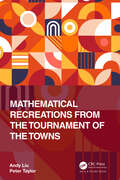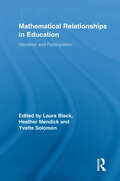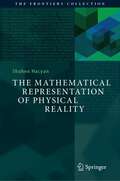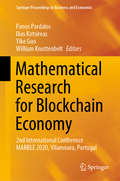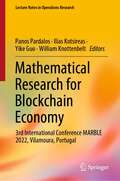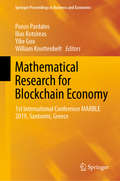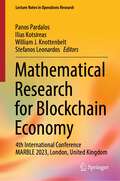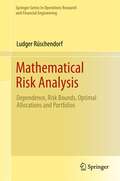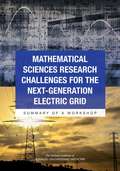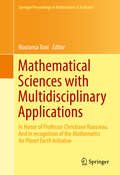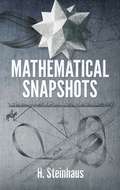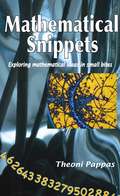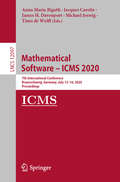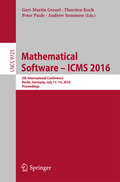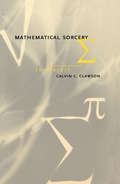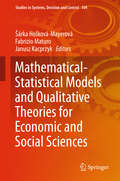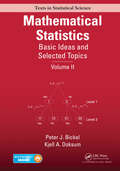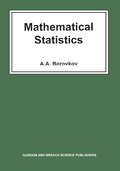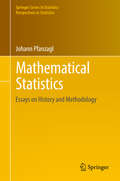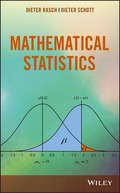- Table View
- List View
Mathematical Reasoning: Analogies, Metaphors, and Images (Studies in Mathematical Thinking and Learning Series)
by Lyn D. EnglishHow we reason with mathematical ideas continues to be a fascinating and challenging topic of research--particularly with the rapid and diverse developments in the field of cognitive science that have taken place in recent years. Because it draws on multiple disciplines, including psychology, philosophy, computer science, linguistics, and anthropology, cognitive science provides rich scope for addressing issues that are at the core of mathematical learning. Drawing upon the interdisciplinary nature of cognitive science, this book presents a broadened perspective on mathematics and mathematical reasoning. It represents a move away from the traditional notion of reasoning as "abstract" and "disembodied", to the contemporary view that it is "embodied" and "imaginative." From this perspective, mathematical reasoning involves reasoning with structures that emerge from our bodily experiences as we interact with the environment; these structures extend beyond finitary propositional representations. Mathematical reasoning is imaginative in the sense that it utilizes a number of powerful, illuminating devices that structure these concrete experiences and transform them into models for abstract thought. These "thinking tools"--analogy, metaphor, metonymy, and imagery--play an important role in mathematical reasoning, as the chapters in this book demonstrate, yet their potential for enhancing learning in the domain has received little recognition. This book is an attempt to fill this void. Drawing upon backgrounds in mathematics education, educational psychology, philosophy, linguistics, and cognitive science, the chapter authors provide a rich and comprehensive analysis of mathematical reasoning. New and exciting perspectives are presented on the nature of mathematics (e.g., "mind-based mathematics"), on the array of powerful cognitive tools for reasoning (e.g., "analogy and metaphor"), and on the different ways these tools can facilitate mathematical reasoning. Examples are drawn from the reasoning of the preschool child to that of the adult learner.
Mathematical Reasoning: The History and Impact of the DReaM Group
by Greg MichaelsonThis collection of essays examines the key achievements and likely developments in the area of automated reasoning. In keeping with the group ethos, Automated Reasoning is interpreted liberally, spanning underpinning theory, tools for reasoning, argumentation, explanation, computational creativity, and pedagogy. Wider applications including secure and trustworthy software, and health care and emergency management. The book starts with a technically oriented history of the Edinburgh Automated Reasoning Group, written by Alan Bundy, which is followed by chapters from leading researchers associated with the group. Mathematical Reasoning: The History and Impact of the DReaM Group will attract considerable interest from researchers and practitioners of Automated Reasoning, including postgraduates. It should also be of interest to those researching the history of AI.
Mathematical Reasoning of Children and Adults: Teaching and Learning from an Interdisciplinary Perspective
by Alina Galvão Spinillo Síntria Labres Lautert Rute Elizabete de Souza Rosa BorbaThis book adopts an interdisciplinary approach to investigate the development of mathematical reasoning in both children and adults and to show how understanding the learner’s cognitive processes can help teachers develop better strategies to teach mathematics. This contributed volume departs from the interdisciplinary field of psychology of mathematics education and brings together contributions by researchers from different fields and disciplines, such as cognitive psychology, neuroscience and mathematics education. The chapters are presented in the light of the three instances that permeate the entire book: the learner, the teacher, and the teaching and learning process. Some of the chapters analyse the didactic challenges that teachers face in the classroom, such as how to interpret students' reasoning, the use of digital technologies, and their knowledge about mathematics. Other chapters examine students' opinions about mathematics, and others analyse the ways in which students solve situations that involve basic and complex mathematical concepts. The approaches adopted in the description and interpretation of the data obtained in the studies documented in this book point out the limits, the development, and the possibilities of students' thinking, and present didactic and cognitive perspectives to the learning scenarios in different school settings. Mathematical Reasoning of Children and Adults: Teaching and Learning from an Interdisciplinary Perspective will be a valuable resource for both mathematics teachers and researchers studying the development of mathematical reasoning in different fields, such as mathematics education, educational psychology, cognitive psychology, and developmental psychology.
Mathematical Recreations from the Tournament of the Towns (AK Peters/CRC Recreational Mathematics Series)
by Andy Liu Peter TaylorMathematical Recreations from the Tournament of the Towns contains the complete list of problems and solutions to the International Mathematics Tournament of the Towns from Fall 2007 to Spring 2021.The primary audience for this book is the army of recreational mathematicians united under the banner of Martin Gardner. It should also have great value to students preparing for mathematics competitions and trainers of such students. This book also provides an entry point for students in upper elementary schools. Features Huge recreational value to mathematics enthusiasts Accessible to upper-level high school students Problems classified by topics such as two-player games, weighing problems, mathematical tasks etc.
Mathematical Relationships in Education: Identities and Participation (Routledge Research in Education)
by Heather Mendick Laura Black Yvette SolomonThis book brings together scholars working in the field of mathematics education to examine the ways in which learners form particular relationships with mathematics in the context of formal schooling. While demand for the mathematically literate citizen increases, many learners continue to reject mathematics and experience it as excluding and exclusive, even when they succeed at it. In exploring this phenomenon, this volume focuses on learners' developing sense of self and their understanding of the part played by mathematics in it. It recognizes the part played by emotional responses, the functioning of classroom communities of practice, and by discourses of mathematics education in this process. It thus blends perspectives from psychoanalysis, socio-cultural theory and discursive approaches in a focus on the classic issues of selection and assessment, pedagogy, curriculum, choice, and teacher development.
The Mathematical Representation of Physical Reality (The Frontiers Collection)
by Shahen HacyanThis book deals with the rise of mathematics in physical sciences, beginning with Galileo and Newton and extending to the present day. The book is divided into two parts. The first part gives a brief history of how mathematics was introduced into physics—despite its "unreasonable effectiveness" as famously pointed out by a distinguished physicist—and the criticisms it received from earlier thinkers. The second part takes a more philosophical approach and is intended to shed some light on that mysterious effectiveness. For this purpose, the author reviews the debate between classical philosophers on the existence of innate ideas that allow us to understand the world and also the philosophically based arguments for and against the use of mathematics in physical sciences. In this context, Schopenhauer’s conceptions of causality and matter are very pertinent, and their validity is revisited in light of modern physics. The final question addressed is whether the effectiveness of mathematics can be explained by its “existence” in an independent platonic realm, as Gödel believed.The book aims at readers interested in the history and philosophy of physics. It is accessible to those with only a very basic (not professional) knowledge of physics.
Mathematical Research for Blockchain Economy: 2nd International Conference MARBLE 2020, Vilamoura, Portugal (Springer Proceedings in Business and Economics)
by Panos Pardalos Ilias Kotsireas Yike Guo William KnottenbeltThis book presents the best papers from the 2nd International Conference on Mathematical Research for Blockchain Economy (MARBLE) 2020, held in Vilamoura, Portugal. While most blockchain conferences and forums are dedicated to business applications, product development or Initial Coin Offering (ICO) launches, this conference focused on the mathematics behind blockchain to bridge the gap between practice and theory. Blockchain Technology has been considered as the most fundamental and revolutionising invention since the Internet. Every year, thousands of blockchain projects are launched and circulated in the market, and there is a tremendous wealth of blockchain applications, from finance to healthcare, education, media, logistics and more. However, due to theoretical and technical barriers, most of these applications are impractical for use in a real-world business context. The papers in this book reveal the challenges and limitations, such as scalability, latency, privacy and security, and showcase solutions and developments to overcome them.
Mathematical Research for Blockchain Economy: 3rd International Conference MARBLE 2022, Vilamoura, Portugal (Lecture Notes in Operations Research)
by Panos Pardalos Ilias Kotsireas Yike Guo William KnottenbeltThis book presents the best papers from the 3rd International Conference on Mathematical Research for Blockchain Economy (MARBLE) 2022, held in Vilamoura, Portugal. While most blockchain conferences and forums are dedicated to business applications, product development or Initial Coin Offering (ICO) launches, this conference focuses on the mathematics behind blockchain to bridge the gap between practice and theory.Blockchain Technology has been considered as the most fundamental and revolutionising invention since the Internet. Every year, thousands of blockchain projects are launched and circulated in the market, and there is a tremendous wealth of blockchain applications, from finance to healthcare, education, media, logistics and more. However, due to theoretical and technical barriers, most of these applications are impractical for use in a real-world business context. The papers in this book reveal the challenges and limitations, such as scalability, latency, privacy and security, and showcase solutions and developments to overcome them.
Mathematical Research for Blockchain Economy: 1st International Conference MARBLE 2019, Santorini, Greece (Springer Proceedings in Business and Economics)
by Panos Pardalos Ilias Kotsireas William Knottenbelt Yike GuoThis book presents the best papers from the 1st International Conference on Mathematical Research for Blockchain Economy (MARBLE) 2019, held in Santorini, Greece. While most blockchain conferences and forums are dedicated to business applications, product development or Initial Coin Offering (ICO) launches, this conference focused on the mathematics behind blockchain to bridge the gap between practice and theory. Every year, thousands of blockchain projects are launched and circulated in the market, and there is a tremendous wealth of blockchain applications, from finance to healthcare, education, media, logistics and more. However, due to theoretical and technical barriers, most of these applications are impractical for use in a real-world business context. The papers in this book reveal the challenges and limitations, such as scalability, latency, privacy and security, and showcase solutions and developments to overcome them.
Mathematical Research for Blockchain Economy: 4th International Conference MARBLE 2023, London, United Kingdom (Lecture Notes in Operations Research)
by Panos Pardalos Ilias Kotsireas William J. Knottenbelt Stefanos LeonardosThis book presents the best papers from the 4th International Conference on Mathematical Research for Blockchain Economy (MARBLE) 2023, held in London, UK. While most blockchain conferences and forums are dedicated to business applications, product development, or Initial Coin Offering (ICO) launches, this conference focused on the mathematics behind blockchain to bridge the gap between practice and theory. The book spans the divide between theoretical promise and practical reality in blockchain technology and explores the challenges hindering its real-world integration across diverse sectors, offering comprehensive insights into issues like scalability, security, and privacy.
Mathematical Risk Analysis
by Ludger RüschendorfThe author's particular interest in the area of risk measures is to combine this theory with the analysis of dependence properties. The present volume gives an introduction of basic concepts and methods in mathematical risk analysis, in particular of those parts of risk theory that are of special relevance to finance and insurance. Describing the influence of dependence in multivariate stochastic models on risk vectors is the main focus of the text that presents main ideas and methods as well as their relevance to practical applications. The first part introduces basic probabilistic tools and methods of distributional analysis, and describes their use to the modeling of dependence and to the derivation of risk bounds in these models. In the second, part risk measures with a particular focus on those in the financial and insurance context are presented. The final parts are then devoted to applications relevant to optimal risk allocation, optimal portfolio problems as well as to the optimization of insurance contracts. Good knowledge of basic probability and statistics as well as of basic general mathematics is a prerequisite for comfortably reading and working with the present volume, which is intended for graduate students, practitioners and researchers and can serve as a reference resource for the main concepts and techniques.
The Mathematical Sciences in 2025
by Committee on the Mathematical Sciences in 2025The mathematical sciences are part of nearly all aspects of everyday life--the discipline has underpinned such beneficial modern capabilities as Internet search, medical imaging, computer animation, numerical weather predictions, and all types of digital communications. The Mathematical Sciences in 2025 examines the current state of the mathematical sciences and explores the changes needed for the discipline to be in a strong position and able to maximize its contribution to the nation in 2025. It finds the vitality of the discipline excellent and that it contributes in expanding ways to most areas of science and engineering, as well as to the nation as a whole, and recommends that training for future generations of mathematical scientists should be re-assessed in light of the increasingly cross-disciplinary nature of the mathematical sciences. In addition, because of the valuable interplay between ideas and people from all parts of the mathematical sciences, the report emphasizes that universities and the government need to continue to invest in the full spectrum of the mathematical sciences in order for the whole enterprise to continue to flourish long-term.
Mathematical Sciences Research Challenges for the Next-Generation Electric Grid: Summary of a Workshop
by Michelle SchwalbeIf the United States is to sustain its economic prosperity, quality of life, and global competitiveness, it must continue to have an abundance of secure, reliable, and affordable energy resources. There have been many improvements in the technology and capability of the electric grid over the past several decades. Many of these advances to the grid depend on complex mathematical algorithms and techniques, and as the complexity of the grid has increased, the analytical demands have also increased. The workshop summarized in this report was developed as part of an ongoing study of the Committee on Analytical Research Foundations for the Next-Generation Electric Grid. Mathematical Sciences Research Challenges for the Next-Generation Electric Grid summarizes the presentations and discussions from this workshop. This report identifies critical areas of mathematical and computational research that must be addressed for the next-generation electric transmission and distribution system and to identify future needs and ways that current research efforts in these areas could be adjusted or augmented.
Mathematical Sciences with Multidisciplinary Applications
by Bourama ToniThis book is the fourth in a multidisciplinary series which brings together leading researchers in the STEAM-H disciplines (Science, Technology, Engineering, Agriculture, Mathematics and Health) to present their perspective on advances in their own specific fields, and to generate a genuinely interdisciplinary collaboration that transcends parochial subject-matter boundaries. All contributions are carefully edited, peer-reviewed, reasonably self-contained, and pedagogically crafted for a multidisciplinary readership. Contributions are drawn from a variety of fields including mathematics, statistics, game theory and behavioral sciences, biomathematics and physical chemistry, computer science and human-centered computing. This volume is dedicated to Professor Christiane Rousseau, whose work inspires the STEAM-H series, in recognition of her passion for the mathematical sciences and her on-going initiative, the Mathematics of Planet Earth paradigm of interdisciplinarity. The volume's primary goal is to enhance interdisciplinary understanding between these areas of research by showing how new advances in a particular field can be relevant to open problems in another and how many disciplines contribute to a better understanding of relevant issues at the interface of mathematics and the sciences. The main emphasis is on important methods, research directions and applications of analysis within and beyond each field. As such, the volume aims to foster student interest and participation in the STEAM-H domain, as well as promote interdisciplinary research collaborations. The volume is valuable as a reference of choice and a source of inspiration for a broad spectrum of scientists, mathematicians, research students and postdoctoral fellows.
Mathematical Snapshots
by H. SteinhausNumerous photographs and diagrams help explain and illustrate mathematical phenomena in this series of thought-provoking expositions. Ranging from simple puzzles and games to more advanced problems, topics include the psychology of lottery players, the arrangement of chromosomes in a human cell, new and larger prime numbers, the fair division of a cake, how to find the shortest possible way to link a dozen locations by rail, and many other absorbing conundrums. A fascinating glimpse into the world of numbers and their uses. 1969 edition. 391 black-and-white illustrations.
Mathematical Snippets
by Theoni PappasFrom nutritional labels and box office statistics to terabytes and megapixels, the 21st century world is awash in numbers. How can the average Joe or Jane make sense of all that data? The key, Theoni Pappas argues, is math. In Mathematical Snippets, she draws readers into the fascinating world of math without overwhelming them with mind-numbing equations. Short, engaging sections on everything from golf to game theory introduce mathematical concepts and celebrate math's impact on daily life.
Mathematical Software – ICMS 2020: 7th International Conference, Braunschweig, Germany, July 13–16, 2020, Proceedings (Lecture Notes in Computer Science #12097)
by Anna Maria Bigatti Jacques Carette James H. Davenport Michael Joswig Timo De WolffThis book constitutes the proceedings of the 7th International Conference on Mathematical Software, ICMS 2020, held in Braunschweig, Germany, in July 2020. The 48 papers included in this volume were carefully reviewed and selected from 58 submissions. The program of the 2020 meeting consisted of 20 topical sessions, each of which providing an overview of the challenges, achievements and progress in a environment of mathematical software research, development and use.
Mathematical Software - ICMS 2016
by Gert-Martin Greuel Thorsten Koch Peter Paule Andrew SommeseThis book constitutes the proceedings of the 5th International Conference on Mathematical Software, ICMS 2015, held in Berlin, Germany, in July 2016. The 68 papers included in this volume were carefully reviewed and selected from numerous submissions. The papers are organized in topical sections named: univalent foundations and proof assistants; software for mathematical reasoning and applications; algebraic and toric geometry; algebraic geometry in applications; software of polynomial systems; software for numerically solving polynomial systems; high-precision arithmetic, effective analysis, and special functions; mathematical optimization; interactive operation to scientific artwork and mathematical reasoning; information services for mathematics: software, services, models, and data; semDML: towards a semantic layer of a world digital mathematical library; miscellanea.
Mathematical Sorcery: Revealing the Secrets of Numbers
by Calvin C. ClawsonThe secret of constellations, the enigma of the golden mean, and the brilliance of a proof-these are just some of the wonders Clawson explores with unbridled delight in this recreational math book. Throughout the book he divulges the wisdom of the ancient Greeks, Sumerians, Babylonians, and Egyptians, whose stunning revelations still have deep meaning today. Transporting us beyond mere appreciation, Clawson urges us to tackle functions, tangents, and the concept of infinity. He helps us intuitively comprehend these and other building blocks of mathematics through explaining their discovery and uses. By accompanying him on his journey, we taste the fruit of knowledge that has eluded us until now.
Mathematical-Statistical Models and Qualitative Theories for Economic and Social Sciences
by Janusz Kacprzyk Fabrizio Maturo Šárka Hošková-MayerováThis book presents a broad spectrum of problems related to statistics, mathematics, teaching, social science, and economics as well as a range of tools and techniques that can be used to solve these problems. It is the result of a scientific collaboration between experts in the field of economic and social systems from the University of Defence in Brno (Czech Republic), G. d'Annunzio University of Chieti-Pescara (Italy), Pablo de Olavid eUniversity of Sevilla (Spain), and Ovidius University in Constanţa, (Romania). The studies included were selected using a peer-review process and reflect heterogeneity and complexity of economic and social phenomena. They and present interesting empirical research from around the globe and from several research fields, such as statistics, decision making, mathematics, complexity, psychology, sociology and economics. The volume is divided into two parts. The first part, "Recent trends in mathematical and statistical models for economic and social sciences", collects papers on quantitative matters, which propose mathematical and statistical models for social sciences, economics, finance, and business administration. The second part, "Recent trends in qualitative theories for economic and social sciences", includes papers on qualitative matters, which discuss social, economic, and teaching issues. It is an ideal reference work for all those researchers interested in recent quantitative and qualitative tools. Covering a wide range of topics, it appeals in equal measure to mathematicians, statisticians, sociologists, philosophers, and specialists in the fields of communication, social and political sciences.
Mathematical Statistics: Basic Ideas and Selected Topics, Volume II (Chapman And Hall/crc Texts In Statistical Science Ser. #119)
by Peter J. Bickel Kjell A. DoksumMathematical Statistics: Basic Ideas and Selected Topics, Volume II presents important statistical concepts, methods, and tools not covered in the authors' previous volume. This second volume focuses on inference in non- and semiparametric models. It not only reexamines the procedures introduced in the first volume from a more sophisticated point o
Mathematical Statistics (Selected Translations On Mathematical Statistics And Probability Ser. #Vol. 2)
by A A BorokovA wide-ranging, extensive overview of modern mathematical statistics, this work reflects the current state of the field while being succinct and easy to grasp. The mathematical presentation is coherent and rigorous throughout. The author presents classical results and methods that form the basis of modern statistics, and examines the foundations o
Mathematical Statistics
by Johann PfanzaglIn the middle of the last century the development of mathematical statistics underwent an enduring change, due to the use of more refined mathematical tools. New concepts like sufficiency, superefficiency, adaptivity etc. motivated scholars to reflect upon the interpretation of mathematical concepts in terms of their real-world relevance. Questions concerning the optimality of estimators, for instance, had remained unanswered for decades, as a meaningful concept of optimality (based on regularity of the estimators, the representation of their limit distribution and assertions about their concentration by means of Anderson's Theorem) was not yet available. The rapidly developing asymptotic theory provided approximate answers to questions for which non-asymptotic theory had found no satisfying solutions. In four engaging essays, Pfanzagl's book presents a detailed description of how the use of mathematical methods stimulated the development of a statistical theory. A book on the history of mathematical statistics would offer a description of who did what and when. Pfanzagl's book, centred on questions of methodology, points to missed opportunities, questionable proofs, neglected questions of priority, and to the presence of such deficiencies even in recent textbooks.
Mathematical Statistics
by Dieter Rasch Dieter SchottExplores mathematical statistics in its entirety—from the fundamentals to modern methods This book introduces readers to point estimation, confidence intervals, and statistical tests. Based on the general theory of linear models, it provides an in-depth overview of the following: analysis of variance (ANOVA) for models with fixed, random, and mixed effects; regression analysis is also first presented for linear models with fixed, random, and mixed effects before being expanded to nonlinear models; statistical multi-decision problems like statistical selection procedures (Bechhofer and Gupta) and sequential tests; and design of experiments from a mathematical-statistical point of view. Most analysis methods have been supplemented by formulae for minimal sample sizes. The chapters also contain exercises with hints for solutions. Translated from the successful German text, Mathematical Statistics requires knowledge of probability theory (combinatorics, probability distributions, functions and sequences of random variables), which is typically taught in the earlier semesters of scientific and mathematical study courses. It teaches readers all about statistical analysis and covers the design of experiments. The book also describes optimal allocation in the chapters on regression analysis. Additionally, it features a chapter devoted solely to experimental designs. Classroom-tested with exercises included Practice-oriented (taken from day-to-day statistical work of the authors) Includes further studies including design of experiments and sample sizing Presents and uses IBM SPSS Statistics 24 for practical calculations of data Mathematical Statistics is a recommended text for advanced students and practitioners of math, probability, and statistics.
